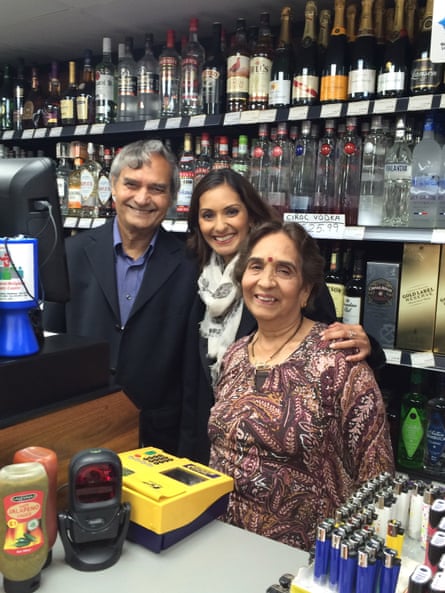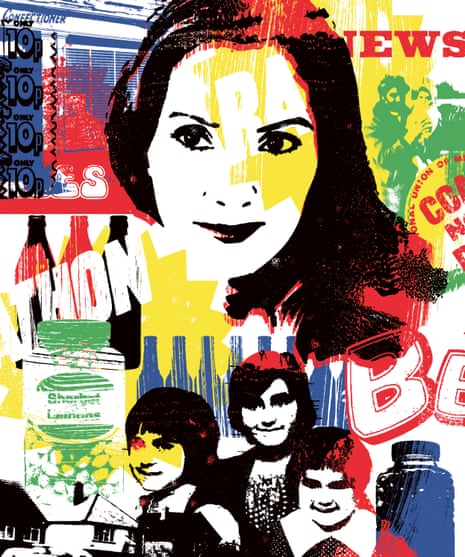I am a corner shop kid and my childhood home was shared with our customers for more than a decade. We – a family of five – ate, slept, lived and worked in the shop. We served you and you gave us business, but there was a world beyond the counter that you never knew. My parents’ store near Reading was the perfect place to learn about society as a child, absorbing shoppers’ thoughts and habits. Take Mrs Fay, who could map out the shop floor and its contents like an expert Crystal Maze contestant. Her photographic memory meant she often knew the layout better than any of us. If we rearranged anything, Mrs Fay would want to know about it so she could get her shopping list in the right order as she recited the items, aisle by aisle.
There are 50,000 corner shops in the UK, their sales worth a fifth of the grocery sector. Perhaps your local shopkeeper resembles my mum and dad; born in India, they were shopkeepers for more than 20 years. Whoever it is, they have taken on a role that remains firmly entrenched in British life.
The grid-like rows of terraced housing that emerged in the Victorian era were designed to cope with a booming urban population. The shop on the corner evolved as a way to service these communities and became something much more significant: any family taking on the corner shop was instantly propelled into the frontline of community life.
My parents’ foray into this world was more about opportunity than some inherent link that is often associated with Asians and local shops. Like tens of thousands of immigrants who arrived in the UK in the late 1960s, they helped fill a labour shortage in factory floors across the country. But with slow career progression and discrimination, they looked for an opportunity. They wanted to work for themselves and the corner shop provided a solution, perfect for an enthusiastic, newly married couple in their late 20s with an astonishing work ethic.
I grew up in 1980s Britain and my shop window revealed a country that was dealing with racial tension, recession and the policies of Margaret Thatcher’s government. Customers would regularly dissect newspaper headlines with Mum and Dad in a way that would give prime minister’s questions a run for its money. The riots that engulfed the early 1980s would provide ample opportunity to play Speaker of the House. This was put to the test when a local builder decided to rant about what he called the colour problem. While his conversation fuelled an uncomfortable debate over a copy of the News of the World with a Guardian reader, our family observed the mantra of “keep your door open, your mouth shut and smile sweetly at any passing trade”. It saved us any aggro in the longer term.
For many families, the shop was also their introduction to modern Britain. In 1977, Mum and Dad took on a small grocery store in the Cemetery Junction area of Reading. It had been left in a dilapidated state by the previous owners, who’d had it for more than 50 years. Not put off by the dirty shelves or soiled floor, my parents were instead encouraged by a solid clientele. Their venture was also perfectly timed. The industrial action of the 1970s meant power cuts and a demand for paraffin, which kept the shopkeepers of Britain busy – and in profit. Shop number two was purchased in 1981 and suddenly we entered a gruelling work regime of 5am wake-up calls and late-night closing. As a newsagent, it pushed us into the goldmine territory of newspapers, cigarettes and booze, and, for me, this is where the memories of shop life are most vivid.
It was a world I cared little for and I spent hours daydreaming of the day I could break free: no more mopping floors and stacking shelves. My sisters were my co-pilots, but being the youngest of three girls I was spared the heavy lifting, such as hauling cases of Pedigree Chum across the cash-and-carry car park. Sweets were my domain. I was in awe of the rows of glass jars housing a variety of treats that sat on high shelves behind the counter. One attempt to reach those dizzy heights went badly wrong and cost my parents £325 when I broke the weighing scales. They couldn’t issue me with a P45, but a slap on the wrist was enough to put me off trying again.

Those who came to Britain from east Africa and India in the 1960s and 1970s were willing to take on what seemed like a dying trade, navigating the long hours and Sunday trading. (Between 1956 and 1960, the number of general stores fell by 56.2%.) But it came at a price. One Thursday afternoon in 1988, as Mum was closing for lunch a man walked in and tried to buy a Mars bar with a £20 note. Mum refused to serve him, partly on the basis that she didn’t have change, plus he was keeping her from a break. The man returned with a pound note and when she opened the till, he pulled out a knife, getting away with that morning’s takings. Fortunately, he didn’t see the bag of cash by Mum’s feet on the right of the counter, ready for Dad to drop off at the bank. He missed out on £1,000 and instead stole a hundred-odd pounds and the confidence of a shopkeeper who had dedicated her life to serving the public.
The corner shop remains a lifeline for many immigrant communities. Refugees who have fled the civil war in Sri Lanka can now be seen behind counters across the UK. The Afghan community who have left a homeland burdened by war to seek a better life abroad can also be spotted opening shutters of local shops in the early hours. And since Poland joined the EU in 2004, Poles have made no apologies for setting up shop, too.
Habits are changing too. Frequent top-up shops are back in favour. We have this change to thank for supermarkets rebranding their smaller stores in an attempt to conquer corner shop terrain. According to a 2017 Waitrose report, one in 10 people decide what to buy for their evening meal just before they eat it – often shopping for it on their way home from work. The “pop to the shop” routine is back in vogue and the convenience store market is forecast to grow by 17.6% between 2018 and 2023.
Online retail might be the latest challenge, but it’s still some way from replicating the trust customers feel when they walk into a local shop. The best type of customer for a corner shop kid is one who can make your insides ache from laughing. Arthur was such a man. His routine would involve a morning visit to collect his newspaper, then he’d return later in the day to buy a copy of the local Evening Post, which would arrive at 5.30pm. He would stake out his position until closing time and became as regular a fixture in the shop as the rows of shelving. Now retired, his days of serving as a soldier during the second world war were long forgotten. It was his visits to our shop that gave structure to his day. A widower with no children, we were Arthur’s family. And for every day that he kept a watchful eye over Mum during cashing-up time, we did our bit to relieve him of his boredom and loneliness. Customers expected to see Arthur as much as they expected the 1kg bag of cat litter to be on special offer. He was one of only a few who understood what our world was all about.
At least once or twice a week you can spot an elderly Indian couple in Reading squeezing the courgettes in Aldi and sizing up the tomatoes in Tesco. They still scour the supermarket shelves searching for best buys and lamenting the extortionate prices. Mum and Dad shut up shop in 1998 in the face of stiff competition from the supermarkets that were dominating the local landscape. They don’t miss the early morning wake-up calls or long hours. What they miss most is you, their customer. Look a little closer and, hidden behind the shop counter, you might see a young girl peering up at you, guessing at why you have entered her world. Maybe the shop is breeding the next generation of journalists who will discover how shop-floor banter can be a useful means of gathering information. Whether the corner shop can survive long term depends on the unwritten pact between shopkeeper and customer. If obeyed, it shall continue to serve a nation.
The Corner Shop: Shopkeepers, the Sharmas and the Making of Modern Britain by Babita Sharma (Two Roads, £16.99). To order a copy go to guardianbookshop.com. Free UK p&p on all online orders over £15
